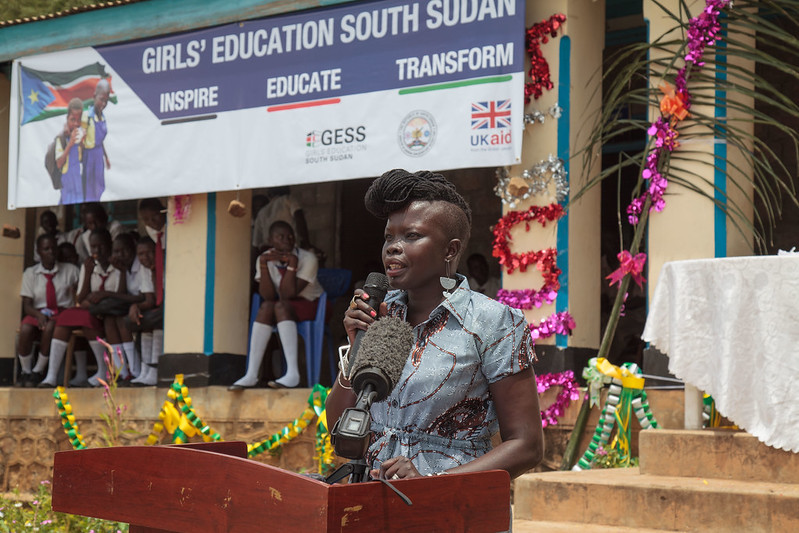Child Marriage: An Obstacle to Education for Girls in South Sudan
 In South Sudan, about three-fourths of girls don’t attend primary school. As the world’s newest country, South Sudan has struggled with economic and political downfalls, resulting in war, violence and the destruction of schools. Alongside high child marriage and teen pregnancy in South Sudan, it’s difficult for girls to attend school or even to have the option of an education at all.
In South Sudan, about three-fourths of girls don’t attend primary school. As the world’s newest country, South Sudan has struggled with economic and political downfalls, resulting in war, violence and the destruction of schools. Alongside high child marriage and teen pregnancy in South Sudan, it’s difficult for girls to attend school or even to have the option of an education at all.
Economic, social and political changes have to be made to provide a better education for girls in South Sudan. From state-issued fundraising to environmental amendments, more girls will be able to attend school. With more girls in school, cases such as child marriages will begin to decrease, resulting in a brighter future for girls nationwide.
Social Issues
One of the many social, controversial issues plaguing South Sudan is the high rate of child marriages. Approximately 52% of South Sudanese girls are married before age 18. According to Girls not Brides, “Child marriage is driven by gender inequality and the belief that girls are somehow inferior to boys.” Additionally, “Increased school dropout rates push young girls toward marriage and early pregnancies.” Without key motivating factors to keep girls in school, many choose to drop out or not attend at all.
Economic Issues
In 2023, the United Nations Children’s Fund (UNICEF) reported that 70% of the South Sudanese population lives in poverty. According to Girls not Brides, “Child marriage is used as a coping mechanism in response to economic and food insecurity. Families from the poorest households in South Sudan marry off daughters in order to receive dowry.” This is a common practice in South Sudan and raises little to no concerns among citizens.
A 16-year-old South Sudanese girl by the name of Atong was forced to marry a 50-year-old man in July 2011. A 16-year-old South Sudanese girl by the name of Atong was forced to marry a 50-year-old man in July 2011. “I did not know him before. I did not love him,” she said. “I told my family, ‘I don’t want this man.’ My people said, ‘This old man can feed us, you will marry him.”
Political Issues
According to Human Rights Watch (HRW) on child marriage, “There are also gaps in the Transitional Constitution, Penal Code and Child Act related to this harmful practice—including no minimum age of marriage —and no systematic or comprehensive programs to address the root causes of child marriage at the community level.” The Transitional Constitution, for example, “…does not set a minimum age of marriage. Instead, it states that every person had the right to marry a person of the opposite sex and that no marriage shall be entered into without free and full consent.”
This makes it nearly impossible for girls to attend school due to their responsibilities as a wife. According to Broken Chalk, “Shockingly, a girl in South Sudan is more likely to die in childbirth than to complete primary education.” South Sudan lacks a legal framework surrounding many things, including educational requirements. Therefore, the rules and laws are fuzzy and underdeveloped. Additionally, “A lack of quality teaching staff and inadequate school buildings are challenges that add to extreme poverty, as families desperately work for the next meal.”
Solutions
While South Sudan is far from exemplary in educating girls and young women, there are possible steps that could be taken to move toward improvements. Child marriage hinders a girl from receiving an education,and to combat this, organizations like the African Union and UNICEF have been collaborating with the government and other partners to raise awareness about the dangers. They are advocating for laws to protect young girls and working to change cultural and social norms that negatively impact them.
For example, UNICEF’s flagship Communities Care Program, designed to “promote gender-equitable and positive social transformation norms,” established 29 community discussion groups and engaged more than 800,000 people in awareness-raising activities. In 2020, the program expanded to tackle sexual violence, teenage pregnancies and child marriage in South Sudan, with 74% of participants reporting positive changes in their beliefs and attitudes.
Although child marriage is still prevalent in South Sudan, with continued efforts from the government and nonprofit organizations like UNICEF, the nation is making great strides toward reducing the incidence and improving the well-being and rights of its young girls.
– London Collins Puc
London is based in West Palm Beach, FL, USA and focuses on Global Health, Politics for The Borgen Project.
Photo: Flickr
